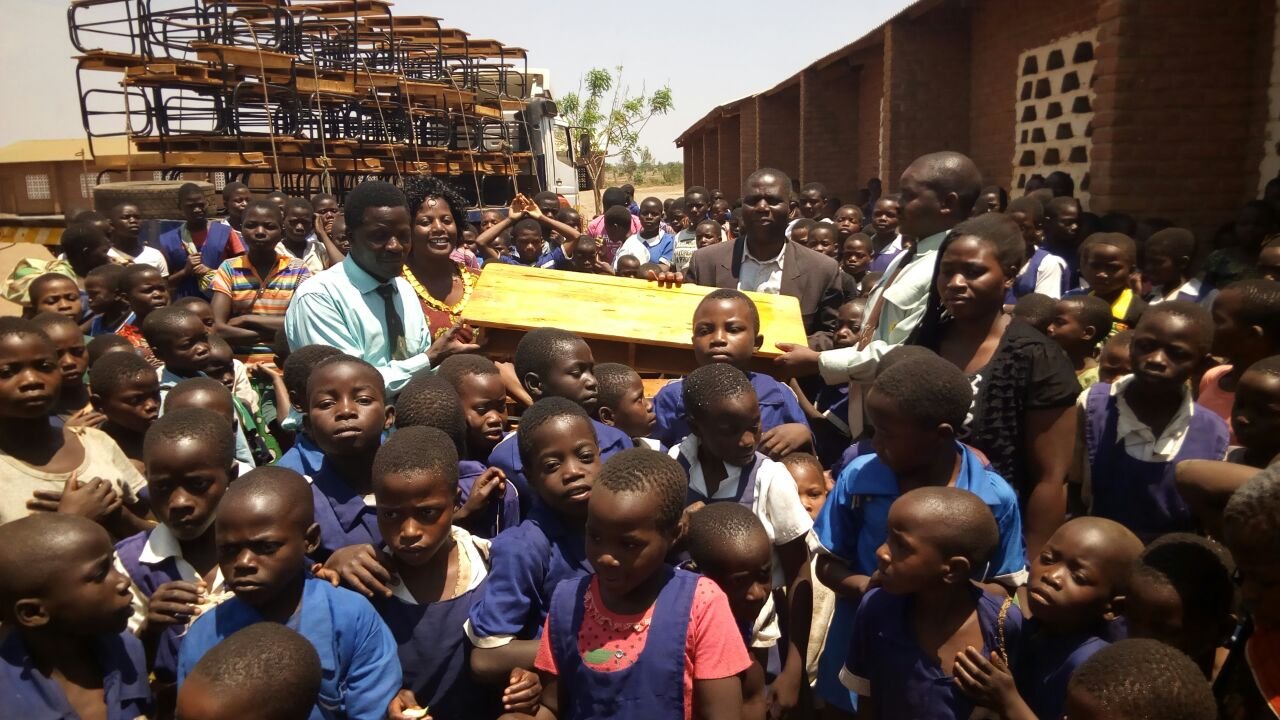Chapsinja Village
Chapsinja is a small village near the capital city of Lilongwe. It is nestled above a small river and lake and is home to 550 villagers. The main work is farming of maize, tending grazing cows and goats, and fishing.
The Village
The Lake
In 2006 a partnership between Hope Missions and Starfish Malawi began to lead a community-led, child-focused initiative in the village. The partnership has provided support for nursery education, a feeding programme for the nursery children, a church building and with the support of Crowborough Men, a nursey was built.
However, when the children graduated from the nursery school they could not go to primary school because the nearest primary school was too far, 6 kilometers away, for a six year old to walk there and back home again. The other problem for young children walking was the river between Chapsinja and the nearest school. This river floods during the rainy season, making it impassable for young children. As a result of these problems, Hope Missions discovered that there was a lot of school children dropping out of school, children starting school at a late age, early marriages amongst the youth and a high percentage of illiteracy in the village. This prompted Hope Missions, working with Chief Chapsinja, to start the education programme. Hope Missions is thankful to Starfish and the Crowborough Men's group for facilitating the education project to become a reality.
The primary school was built over a few years funded by the Men’s Group, which provided four double classrooms, three teachers houses and a staff office. They also equipped the classrooms with desks and equipment.
The Nursery
The Schools
Educational Aids
Classes are Large
Chief Chapsinja became a Christian in 2006 and it is he who has brought the village to love and know God. He is a key person in the community and supports the work of this partnership.
cChief Chapsinja, Chris Knott, Anne Mkanadawire
The project is now moving to a next stage as Crowborough Men are no longer able to support the work, so Starfish will be continuing and hopefully developing the work.
Starfish are now facilitating secondary school sponsorship for children who pass their end of school exams and are selected to go to secondary school. They have also developed a link with Christ Church CE Primary, St Leonards which will aim to develop a living link between Malawi and the UK schools.
Chapsinja school has nearly 1000 students, so there will always be further requirements as the student numbers grow.
Hope Missions
Hope Missions Ministries was founded by Annie Mkandawire in 2003. While on a prayer drive south of Lilongwe in Malawi, Annie was moved by the spiritual and social condition of the people living in poverty in the rural villages.
“ “Be joyful in hope, patient in affliction, faithful in prayer. Share with God’s people who are in need. Practice hospitality.””
Annie began a series of meetings with Chief Thugwalugwa who heads a small village under Group Village Headman Kayabwa in Traditional Authority Chadza. She wanted to find out from him what the specific needs of his village were and also their hopes and dreams for the future. What she found was that many rural communities are locked in a state of despair, unable to find enough hope to help themselves work their way out of poverty.
As one of the 10 poorest countries in the world, Malawi faces numerous problems such as access to education, food security, HIV/AIDS, gender issues and poor nutrition. These issues are far-reaching and they can leave communities devoid of hope. Our organisation began with a vision to transform rural life in Malawi by sharing the hope offered by the Good News of the Gospel of Jesus Christ and by encouraging the people in the communities to unify in vision and purpose to inspire and direct their own development.
Hope Missions draws from the significant experience not only of our staff but also of our trustees and other closely related individuals whose combined total experience in operating community programs is well in excess of 60 years. In all our work we seek to help communities initiate sustainable change and development for themselves rather than cultivating a culture of dependence. To this end much of the work revolves around people, relationships, education and locally available and accessible resources rather than buildings, feeding programmes, cash distributions and imports. If a community’s only resources are its land and people then it is only by helping them utilise these resources in more efficient and effective ways that their development can be self-sustained.
More details about Hope Missions
can be found on their website www.hopemissionsministries.com
From 2016 Chapsinja Village








